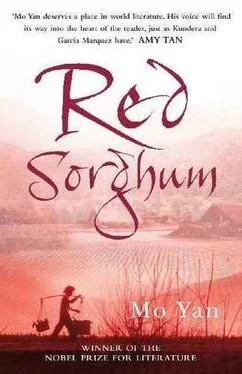As the fire began to die out under the pot of water, he shoved the last handful of straw into the greedy, gaping black mouth of the old Kitchen God and prayed it would burn slowly. But the fuel flared up and burned like mad, with no sign of progress in the pot. So he jumped up, more nimbly than even he thought possible, and dashed into the bedroom, where he ripped out the last few handfuls of straw from under the kang mat, and stuffed them into the stove hole, a desperate attempt to melt the ice in the pot. Then, with brutal determination, he shoved his little three-legged stool into the stove hole and jammed his nearly bald broom down the black throat of the Kitchen God, which belched once or twice and vomited clouds of dense black smoke. Turning pale with fright, he frantically fanned the air around the stove, which kept swallowing, then spewing clouds of smoke. A loud crackle preceded the harsh, glowing flames from the stool and the broom, as he paused to catch his breath. Stung by the smoke, his old eyes shed tears like gummy mucus, which coursed down his leathery face.
The water in the pot began to sizzle like chirping cicadas — music to his ears — and a childlike grin spread across his face. However, when the fire began to dim, his smile was quickly replaced by a look of panic. Jumping to his feet, he searched for something, anything, to burn. The beams and crossbars would work, but he wasn’t strong enough to pull them down. Suddenly he remembered the story of Iron Crutch Li, one of the Eight Immortals, who incinerated his own leg. According to legend, Iron Crutch Li stuck his leg into the stove and listened to it crackle. ‘Dear brother,’ his wife had said, ‘you’ll make yourself a cripple.’ And just as she had forecast, the leg was ruined. Of course Geng knew he was no immortal, and even without burning his leg he could barely take a step. But, gimp or no, he was going to make his way to the branch secretary’s home and demand some grain.
Finally, as the fire in the stove was about to die, Geng’s gaze fell upon the spirit shrine set into the wall, and the black tablet it held. He reached up with his dragon-head cane to knock it loose. Dust flew and fear gripped his old heart as a profound misery suddenly penetrated the marrow of his bones. He picked up the ash-covered fox-spirit tablet, to which he’d made offerings for thirty-six years, and flung it into the belly of the stove. Hungry flames began licking the tablet, which sizzled and spat out juicy, dark red drops… scorching the flesh of the red fox that had diligently licked the eighteen wounds on his body with its cool, glorious tongue. Nothing would ever shake his belief that there was something miraculous about the fox’s tongue, since his wounds had been free of infection even after he’d crawled back to the village.
Although he was sure that his miraculous salvation portended good fortune in his future, it somehow never came. Eventually he became a pensioner, protected by the ‘five guarantees’ of food, clothing, medical aid, housing, and burial, and knew that his good fortune had finally arrived. But even that soon vanished, as he was neglected by everyone, including the little bastard who had been squatting in the basket over the mule’s back whittling a willow switch years earlier — the current branch secretary, who would probably be provincial secretary by now had he not been responsible for the deaths of nine people during the Great Leap Forward. The little bastard had cancelled his eligibility for the ‘five guarantees’.
The wooden tablet burned as slowly as a living fox, and as the blood-red tongues of flame barked away, he heard the water in the pot seethe and boil.
After scooping up the scalding water with the cracked gourd, he quickly sipped a mouthful and sent it coursing down to his stomach. He shuddered, then swallowed another mouthful. Now he was an immortal.
By the time he’d drunk two gourds of the hot water, his body was sweaty, and the lice, rejuvenated by the warmth, began to squirm and crawl around. Now he was hungrier than ever, but at least his strength had returned. Supported by his dragon-head cane, he walked out into the snowy landscape, shards of white jade cracking beneath his feet, his mind as clear as a bright August sky. The street was deserted, except for a black dog who stopped every so often to shake the snow off its back.
He followed the dog to the home of the little bastard, whose shiny black gate was closed tight. Fiery winter-sweet blossoms atop the wall drooped down like bright-red droplets. Absent-mindedly admiring them, he walked up the stone steps, breathed deeply, and knocked on the gate. A dog barked, but there were no human sounds. Suddenly gripped by fury, he leaned against the wall to steady himself, raised his dragon-head cane, and pounded the hasp of the shiny black gate. The dog on the other side roared and howled.
Finally the gate opened. A bright-eyed, pudgy little dog darted out and charged at him, but quickly retreated when Old Geng waved his cane in its face. Next out was a fair-skinned middle-aged woman. ‘Oh, it’s you, Master Geng,’ she said genially when she saw Eighteen Stabs standing at the gate. ‘What can I do for you?’
‘I want to see the secretary,’ he answered hoarsely.
‘He went to a meeting at the commune,’ she said sympathetically.
‘Let me in,’ he said weakly. ‘I want to ask him what right he had to make me ineligible for a pension. I was bayoneted eighteen times by the Japs, but they didn’t kill me. Did I go through all that just so I could starve to death at his hands?’
‘Master Geng,’ the woman said awkwardly, ‘he’s not home, honest. He went to a meeting at the commune early this morning. If you’re hungry, come in and have something to eat. We don’t have much, but there are plenty of yam cakes.’
‘Yam cakes?’ he said icily. ‘Not even your dog eats yam cakes!’
The woman was losing patience. ‘I won’t force you to eat them. He’s not home. He’s in a meeting at the commune. That’s where you’ll find him!’ She pulled her head back in and slammed the gate shut. He raised his cane and pounded on the gate again, but was so weak he nearly crumpled to the ground. As he shuffled through the foot-deep snow on the street, he mumbled, ‘Go to the commune…. Go to the commune…. Sue the little bastard…. Sue him for oppressing decent folk, sue him for holding back my grain.’ Even after he’d walked a long way, he could still smell the delicate fragrance of winter sweets amid the falling snow; he stopped and turned, then spat in the direction of the shiny black gate. The winter-sweet blossoms waved in the falling snowflakes like crackling tongues of flames.
It was nearly dusk by the time he reached the commune gate, whose steel ribs were as big around as his thumb; each was tipped with a barb. He could see through the spaces that the snow on the ground in the commune yard was black and filthy. People in new clothes and new caps, with large heads, fleshy ears, and greasy mouths, were scurrying back and forth. Some carried debristled pigs’ heads — the tips of the ears were blood-red — others carried silvery ribbonfish, and still others carried recently slaughtered chickens and ducks. He banged his dragon-head cane against the metal ribs, raising a loud clatter; but the people inside were too busy to give him anything but chilly glances before continuing on their way. He shouted angrily, tearfully, ‘Your honour… leader… I’ve been treated unjustly…. I’m starving….’
A young man with three fountain pens in his coat pocket walked over and said coolly, ‘What’s all the racket about, old-timer?’
Seeing all those pens in the young man’s pocket, he assumed he’d caught the attention of a ranking official, so he knelt down in the snow, grabbed hold of two metal ribs in the gate, and said tearfully, ‘Eminent leader, the production-brigade branch secretary has held back my grain rations. I haven’t eaten for three days, I’m starving, eighteen stabs by the Japs didn’t kill me, now I’m going to starve to death….’
Читать дальше












